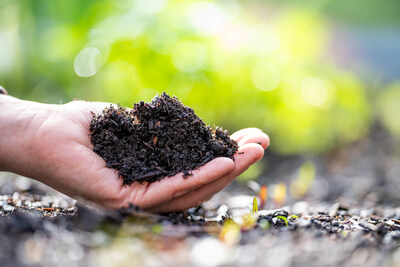Highlights
- Reclaiming mine sites is a deliberate, long-term process that requires a sustained commitment, and it can take years to know if efforts are fully working
- Genome BC is funding a new research partnership with Chu Cho Environmental, the Centerra Gold Inc’s Mount Milligan Mine and Thompson Rivers University (TRU), using genomics to scan for signs of biodiversity recovery in reclaimed soils
- Researchers are examining invertebrates (e.g. insects) and soil samples from a land reclamation project at the Mount Milligan Mine near Prince George to see if invertebrates and select soil microbes can act as early indicators of ecological recovery
VANCOUVER, BC, Sept. 11, 2024 /CNW/ – Mining companies in British Columbia (BC) are required by law to reclaim lands impacted by mining. However, reclaiming land affected by mining activities is a long term process. It can take decades to determine if the land has recovered.
An innovative reclamation project is underway at the Mount Milligan Mine north of Prince George. With co-funding from the Mount Milligan Mine and Genome British Columbia (Genome BC), researchers from Thompson Rivers University (TRU) and Chu Cho Environmental, an environmental research and consulting company owned by Tsay Keh Dene Nation, are testing a new way to evaluate ecological recovery.
“This project is exploring whether these new monitoring methods will more quickly signal if reclamation activities are working,” says Suzanne Gill, Genome BC’s President and Chief Executive Officer. “The key to this project is the use of genomics to test for the presence of invertebrates, such as insects and spiders, and to test for the presence and diversity of fungi and microbes in the soil.”
“It is well known that the activities of microbial communities drive soil development and that invertebrate communities are highly responsive to changes in their environments. So, we are examining whether their presence on the reclamation site and in the soil can be used as early indicators of ecological recovery,” says TRU Researcher Dr. Jonathan Van Hamme.
To assess the effectiveness of reclamation, the research team will compare soil samples from the Mount Milligan Mine to those from three types of reference sites: a regenerating commercial forestry-disturbed area, a regenerating wildfire-disturbed area and an unvegetated bare ground control area.
If successful, this technique can be used to quickly identify sites where reclamation activities are not meeting the goals, allowing for timely adjustments to improve reclamation outcomes.
The use of genomics to examine soil health is an extension of ongoing work by TRU, Chu Cho Environmental and the Mount Milligan Mine.
Using Native Plant Species
Historically, using a commercial seed mix and mono-cropping has been the industry standard; however, as the reclamation field advances there has been a shift towards site specific approaches that use native species sourced from near the site. The Mount Milligan Mine is focused on revegetating the site using native species gathered by local seed collection. Through a collaboration with the McLeod Lake Indian Band and Nak’azdli Whut’en, the Mine is incorporating Traditional Ecological Knowledge in setting land use objectives and reclamation planning. Native plant species are being reintroduced to the site through large-scale collection, propagation and planting.
“We need to continue to improve how we do land reclamation,” says Kristen Marini, Ecologist from Chu Cho Environmental. “Indigenous engagement is important to making sure the reclaimed area will support native plants, animals and traditional land use activities once the area is finished being an active mine.”
About Genome British Columbia:
Genome BC is a not-for-profit organization that has advanced genomics research and innovation for nearly 25 years, growing a world-class life sciences sector in BC and delivering sustainable benefits for British Columbia, Canada and beyond. Genome BC has attracted over $1 billion in direct co-investment to the province, which has contributed to funding more than 550 genomics research and innovation projects. These initiatives enhance healthcare and address environmental and natural resource challenges, improving the lives of British Columbians. Genome BC also integrates genomics into society by supporting responsible research and innovation and fostering an understanding and appreciation of the life sciences among educators, students and the public. www.genomebc.ca
About Chu Cho Environmental:
Chu Cho Environmental (CCE) is a for-profit social enterprise wholly owned by Tsay Keh Dene Nation. In 2013, CCE was devised as a business that would eventually become capable of providing expert environmental services for Tsay Keh Dene Nation and northern British Columbia more broadly. CCE is one example of Tsay Keh Dene’s right to an economy and so we are focused on expanding our scope of services while building a resilient and sustainable business. Our path so far is one of careful and deliberate organic growth with an abiding focus on our commitment as a social enterprise. https://www.youtube.com/@ChuChoEnvironmental
About Centerra Gold:
Centerra Gold Inc. is a Canadian-based gold mining company focused on operating, developing, exploring and acquiring gold and copper properties in North America, Türkiye, and other markets worldwide. Centerra operates two mines: the Mount Milligan Mine in British Columbia, Canada, and the Öksüt Mine in Türkiye. Centerra also owns the Goldfield District Project in Nevada, United States, the Kemess Underground Project in British Columbia, Canada, and owns and operates the Molybdenum Business Unit in the United States and Canada. Centerra’s shares trade on the TSX under the symbol CG and on the NYSE under the symbol CGAU. Centerra is based in Toronto, Ontario, Canada. https://www.centerragold.com
About Thompson Rivers University:
Thompson Rivers University (TRU) is located in Kamloops, British Columbia, Canada. TRU has grown to become a comprehensive institution offering a wide range of undergraduate and graduate programs across various disciplines. TRU is home to the first high-throughput genomic sequencing lab in BC outside the Lower Mainland, TRUGen, under the direction of microbiologist Dr. Jonathan Van Hamme. Its primary focus is environmental remediation, waste treatment, and the agricultural industries, including Canadian food, beverage, and nutraceuticals. The university emphasizes experiential learning, research opportunities and community engagement, preparing students for global careers. With a beautiful campus set against the backdrop of the Thompson River and the surrounding mountains, TRU offers a vibrant student life and a supportive academic environment.
SOURCE Genome British Columbia

Featured Image: Megapixl @ Ipopba







